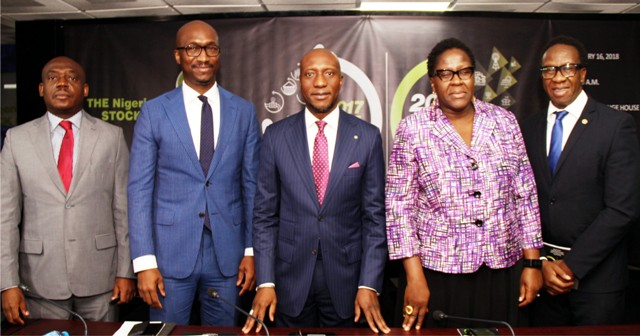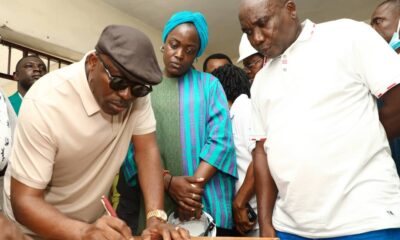Business
Sachet Alcohol Ban: Manufacturers Foresee 5.5m Job Loss
The Distillers and Blenders Association of Nigeria (DIBAN) has said investments worth over N1.2trillion will be lost while 5.5 million direct and indirect workers would be out of jobs if the Federal Government insists on the recent ban implemented against the production and sale of sachet and PET bottle alcohol in the country.
DIBAN, a sub-sector under the Manufacturers Association of Nigeria (MAN), stated in an open letter addressed to President Bola Tinubu.
In the letter, dated February 18, 2024, DIBAN noted that on January 31, 2024, the National Agency for Food and Drug Administration and Control (NAFDAC) placed an outright ban on the production and sale of alcoholic beverages in sachets and PET bottles.
The reasons given by the regulator were that the packaging of alcoholic beverages in sachets and pet bottles was responsible for the increase in alcoholic use among underage and that the packaging of alcoholic beverages in sachets and pet bottles increases the use of hard drugs.
In its pushback, DIBAN argued that NAFDAC had no legal or moral justification for placing an outright ban on the production of alcoholic beverages in sachets and pet bottles.
It said the alcoholic beverages were not produced or manufactured with hard drugs contrary to the assertion of NAFDAC.
The distillers also noted that there were no reports from the National Drug Law Enforcement Agency (NDLEA) to support the position of NAFDAC that the alcoholic beverages in sachets or pet bottles contain any hard drugs.
DIBAN said it had a conglomerate membership of over 24 corporate organisations mostly indigenous companies with few multinationals and are into production and manufacturing of wines and spirits with over 70 per cent local inputs.
The letter reads in part, “DIBAN’S investment is worth over N500billion. Indirect investments of other companies having one business or the other to do with DIBAN is also worth over N800billion.
“DIBAN’s contribution to the economy of Nigeria is worth over N1.2trillion. There are over 500,000 employees in the direct employment of DIBAN. DIBAN also provides indirect employment or work for over five million people”.
According to DIBAN, when NAFDAC first hinted at the ban, the association had spent over N1bn to support various media, advocacy and campaigns in various media outfits both print and electronics to ensure consumption of alcoholic beverages among our youth is not allowed no matter how little.
It further argued that bigger sizes encourage the consumption of bigger portions, while small sizes encourage portion control because it is logical that if you buy small, you consume small but if you buy big you consume big.
“If NAFDAC takes away small sizes, the Agency is simply encouraging excessive consumption of alcoholic beverages”, it said.
Suggesting the way forward, DIBAN urged the President to issue a directive to NAFDAC or an Executive Order immediately lifting the ban by NAFDAC on the production of alcoholic beverages in sachets and pet bottles.
It also called for the establishment of licensed liquor stores/outlets by Local Government Areas across Nigeria.
Business
Over $1.5bn Spent To Protect Nigeria’s Oil Installations -FG

The Federal Government has said it has spent over $1.5 billion from 2020 to date to protect the nation’s oil installations and curb crude oil theft.
The Secretary to the Government of the Federation (SGF), George Akume, made this known, yesterday, at a public hearing of the House of Representatives on crude oil theft.
Akume was represented by the Permanent Secretary, General Services, Maurice Nandi.
The Federal Government was concerned about the report from the Nigerian Extractive Industries Transparency Initiative (NEITI), which pointed to over $46 billion worth of stolen crude between 2009 and 2020.
“The House had set up a special committee, headed by the Chairman of the House Committee on Petroleum Upstream, Ado Doguwa, to investigate the losses in the oil and gas sector,” Akume said.
Additionally, Speaker of the House Tajudeen Abbas, represented by Deputy Speaker Benjamin Kalu, said $10 billion has been lost in seven months to crude oil theft.
Business
FG Unveils Metering Project Teams To Combat Oil Theft

The Nigerian Upstream Petroleum Regulatory Commission (NUPRC) has inaugurated Metering Audit and Advance Cargo Declaration project teams, to promote transparency and accountability in the upstream oil and gas.
The Commission’s Chief Executive, Mr Gbenga Komolafe, who spoke at the inauguration of the project teams, on Wednesday in Abuja, said the projects were designed to combat crude oil theft and boost revenue.
It will be recalled that the Federal Executive Council (FEC) had approved a 21 million dollars contract to audit metering and measurement equipment in the 187 oil flow stations in the country and also put in place an advance cargo declaration solution.
These initiatives as earlier announced by Minister of State for Petroleum Resources Sen. Heineken Lokpobiri, aims at enhancing monitoring and accountability in crude oil production and distribution, addressing rampant oil theft.
Komolafe, while inaugurating the project monitoring teams, announced a four-month deadline for the completion of the projects.
According to him, the initiatives zre in line with NUPRC’s mandate to ensure optimal government revenues from upstream petroleum operations, as specified in the Petroleum Industry Act (PIA) 2021.
He said the projects would be executed by PE Energy Limited and P-Lyne Energy.
“Audit of Upstream Measurement Equipment and Facilities project aims to establish reliable baseline data for all measurement points, identify gaps in production and allocation measurement, and implement targeted interventions to enhance metering infrastructure.
“This project is crucial in addressing issues such as the presence of obsolete equipment, lack of a comprehensive database and absence of real-time production measurement across many locations.
“Advance Cargo Declaration Solution complements the metering audit by establishing a robust system for declaring and tracking crude oil transportation and exports from Nigeria,” he said.
He said the project would monitor and account for the movement of crude oil within the country, prevent disruptions, theft, and under-declaration, and ensure that only certified products were being exported.
“It will also enable real-time tracking, reconciliation, and reporting of crude oil exports to facilitate accurate revenue billing and generation.
“For a long time as a nation we have suffered from the menace of crude oil theft and there have been contentions on the accuracy in terms of our hydrocarbon accounting in Nigeria in a manner that has impacted our federal revenue unfavourably.
“So what has happened is that the commission, within its assumption of office, has been able, as a regulator, to take a very bold measure to address this issue.
“We have 31 crude oil loading terminals. So we are trying to ensure that we put in place a framework where the nation will be able to accurately determine and measure the volume of crude that is loaded from these terminals,” he said.
He tasked the teams, comprising experts from various NUPRC’s departments, to discharge their duties professionally, adding that the projects would be delivered within four months, while any request for timeline extension would not be entertained.
The NURPC boss said that each project had a dedicated team, led by Mr Enorense Amadasu, Executive Commissioner for Development and Production, NURPC, with strict timelines for completion.
While commending President Bola Tinubu for his support, Komolafe urged stakeholders to cooperate with the teams to facilitate successful implementation of the projects.
“Team for Audit of Upstream Measurement Equipment and Facilities in the Nigerian Oil and Gas Industry” project comprise ; Manuel Ibituroko – Deputy Director, Facilities Engineering & Optimisation; Mohammed Sirajo – Manager, Facilities Engineering; Ike Chidi – Manager, Facilities Engineering; and Bashir Shariff – Principal Regulatory Officer.
“Team for Advance Cargo Declaration Solution” project, comprise: Bello Shehu – Assistant Director, Crude Oil & Gas terminal Operations; Abdulrahman Idris – Manager, Petroleum Accounting; Omeje Desmond – Deputy Manager, COTO PHC; Dimkpa I. H. – PRO, COTO Warri and Olatunji Babatunde – NDR”.
He said the teams would liaise with the contractors to ensure the fulfilment of the Commission’s specified obligations and monitoring the implementation of the projects to ensure alignment with the scope and specifications.
Responding, one of the two contractors, Chief Executive Officer, PE Energy Ltd, Daere Akobo, thanked the Federal Government for the confidence repose in them to take a pragmatic look at hydrocarbon accounting.
Also, the Director, P-Lyne Energy, Tomi Ogunwole assured that the company would abide by the four-month deadline set by the commission.
Business
FG Launches Blueprint For Africa’s Digital Trade
The Federal Government of Nigeria has launched a comprehensive strategy to spearhead Africa’s digital trade revolution, aligning with the African Continental Free Trade Agreement (AfCFTA) framework.
The initiative, a key component of President Bola Tinubu’s Renewed Hope Agenda, is aimed at leveraging trade as a driver of economic growth and continental unity in accordance with AfCFTA’s objectives.
According to Vice President Kashim Shettima, in his X handle (formerly twitter), “Nigeria is in a unique position to spearhead the continent’s technological transformation”.
He said the strategy includes implementing AfCFTA’s Digital Trade Protocol, developing technical talent hubs, enhancing digital infrastructure investments, and promoting innovation and entrepreneurship.
Shettima stated this while delivering a keynote address during a stakeholders’ summit with the theme, “Digital Trade in Africa: The Renewed Hope Strategy”, at the Presidential Villa, Abuja.
The Vice President emphasised the need for public-private sector synergy and assured continued government investment in digital infrastructure and human capital development.
On his part, the Minister of Communications, Innovation, and Digital Economy, Bosun Tijjani, highlighted the Tinubu administration’s substantial investments in all aspects of the digital trade protocol, aiming at harnessing opportunities both in Nigeria and across the continent.
He stated that innovative policies and programmes, such as the Three Million Technical Talent programme, the data protection policy, and increased investments in digital infrastructure, were equipping Nigeria’s young population for current and future opportunities.
Tijjani stressed the critical role of technology in facilitating trade across Africa, noting that the unprecedented opportunities within the single market area could be best leveraged through effective collaboration and networking enabled by digital technology.
-
Business3 days ago
NGX Digital Investment Platform Gets SEC Approval
-
Niger Delta3 days ago
Investigate Benin Airport Attack, Edo Urges RG
-

 News1 day ago
News1 day agoStock Market Trends Downward, Investors Lose N118bn
-
Rivers1 day ago
Fubara Tasks Churches On Prayers
-
News3 days ago
Stop Triggering Man-Made Disasters, NSCDC Warns Nigerians
-
Sports3 days ago
Simplified Football Cup Competition To Commence, Aug 12
-

 News1 day ago
News1 day agoFubara Gives Scholarship To 100 Children, Widows Of Fallen Heroes
-
Nation1 day ago
Senate Passes Bill To Ensure Uninterrupted Tenure Of IGPs

